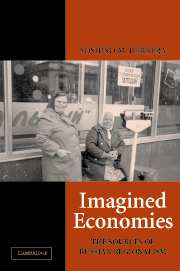Book contents
- Frontmatter
- Contents
- List of Tables
- List of Figures and Maps
- List of Acronyms
- Note on Transliteration
- Acknowledgments
- Imagined Economies
- Introduction
- 1 Regionalism in the Russian Federation: Theories and Evidence
- 2 Imagined Economies: Constructivist Political Economy and Nationalism
- 3 Breaking the Soviet Doxa: Perestroika, Rasstroika, and the Evolution of Regionalism
- 4 To Each His Own: The Development of Heterogeneous Regional Understandings and Interests in Russia
- 5 Imagined Economies in Samara and Sverdlovsk: Differences in Regional Understandings of the Economy
- 6 Regional Understandings of the Economy and Sovereignty: The Economic Basis of the Movement for a Urals Republic
- 7 Regional Understandings, Institutional Context, and the Development of the Movement for a Urals Republic
- Conclusion
- Appendix Tables
- Index
- Cambridge Cultural Social Studies
3 - Breaking the Soviet Doxa: Perestroika, Rasstroika, and the Evolution of Regionalism
Published online by Cambridge University Press: 22 September 2009
- Frontmatter
- Contents
- List of Tables
- List of Figures and Maps
- List of Acronyms
- Note on Transliteration
- Acknowledgments
- Imagined Economies
- Introduction
- 1 Regionalism in the Russian Federation: Theories and Evidence
- 2 Imagined Economies: Constructivist Political Economy and Nationalism
- 3 Breaking the Soviet Doxa: Perestroika, Rasstroika, and the Evolution of Regionalism
- 4 To Each His Own: The Development of Heterogeneous Regional Understandings and Interests in Russia
- 5 Imagined Economies in Samara and Sverdlovsk: Differences in Regional Understandings of the Economy
- 6 Regional Understandings of the Economy and Sovereignty: The Economic Basis of the Movement for a Urals Republic
- 7 Regional Understandings, Institutional Context, and the Development of the Movement for a Urals Republic
- Conclusion
- Appendix Tables
- Index
- Cambridge Cultural Social Studies
Summary
Do economic conditions determine people's interests? Most social science teaches us to presume so. Scholars, consequently, tend to account for the innumerable anomalous cases, which fail to conform to expectation, by resorting to arguments focused on informational deficiencies. Such explanations reinforce the presumption that a proper appraisal of economic conditions would produce the correct articulation of interests. The imagined economies framework offers a powerful and less presumptuous alternative to the traditional notion of how material conditions and articulated interests relate to each other, particularly in cases where there is, objectively, significant difference between them. What people think about the economy, however far-fetched it may seem vis-à-vis measured economic data, can be more important than what we might otherwise consider the statistical truth about their conditions. The originality and usefulness of the framework lie in its explanation of the articulation of interests not in the usual materially measurable terms but in terms of local experience, local categories of analysis, and local intersubjective notions of what economic conditions mean.
Regionalism in the Russian Federation, or nationalism in the USSR, poses two questions for which we still do not have satisfactory answers: First, why do economic interests in greater sovereignty develop beginning in the late 1980s and not before? Clearly, economic conditions had been comparably woeful before 1989. And, second, given the pattern of regionalism, how did a centralized system produce such differentiated understandings of the regional economies – in other words, how did different regions that share a Soviet history, but especially those that share a common language, ethnicity, and even economic structure, come to interpret similar economic events differently.
- Type
- Chapter
- Information
- Imagined EconomiesThe Sources of Russian Regionalism, pp. 98 - 142Publisher: Cambridge University PressPrint publication year: 2004



